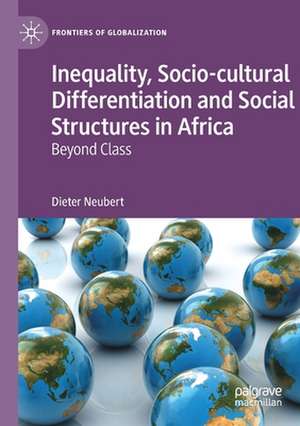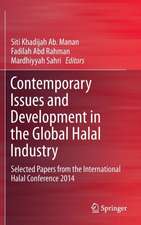Inequality, Socio-cultural Differentiation and Social Structures in Africa: Beyond Class: Frontiers of Globalization
Autor Dieter Neuberten Limba Engleză Paperback – 14 aug 2020
For an analysis of the social structures and persisting extreme inequality in African societies – and in other societies of the world – we need to go beyond class, consider the empirical realities and provincialise our conventional theories. This book develops a new framework for the analysis of social structure based on empirical findings and more nuanced approaches, including livelihood analysis and intersectionality, and will be useful for students and scholars in African studies and development studies, sociology, social anthropology, political science and geography.
| Toate formatele și edițiile | Preț | Express |
|---|---|---|
| Paperback (1) | 700.94 lei 6-8 săpt. | |
| Springer International Publishing – 14 aug 2020 | 700.94 lei 6-8 săpt. | |
| Hardback (1) | 713.19 lei 6-8 săpt. | |
| Springer International Publishing – 8 iul 2019 | 713.19 lei 6-8 săpt. |
Preț: 700.94 lei
Preț vechi: 824.63 lei
-15% Nou
Puncte Express: 1051
Preț estimativ în valută:
134.17€ • 145.78$ • 112.77£
134.17€ • 145.78$ • 112.77£
Carte tipărită la comandă
Livrare economică 21 aprilie-05 mai
Preluare comenzi: 021 569.72.76
Specificații
ISBN-13: 9783030171131
ISBN-10: 3030171132
Pagini: 433
Ilustrații: XI, 433 p. 8 illus., 1 illus. in color.
Dimensiuni: 148 x 210 mm
Greutate: 0.53 kg
Ediția:1st ed. 2019
Editura: Springer International Publishing
Colecția Palgrave Macmillan
Seria Frontiers of Globalization
Locul publicării:Cham, Switzerland
ISBN-10: 3030171132
Pagini: 433
Ilustrații: XI, 433 p. 8 illus., 1 illus. in color.
Dimensiuni: 148 x 210 mm
Greutate: 0.53 kg
Ediția:1st ed. 2019
Editura: Springer International Publishing
Colecția Palgrave Macmillan
Seria Frontiers of Globalization
Locul publicării:Cham, Switzerland
Cuprins
1. Introduction: The Middle Class Debate and Its Limits.- 2. Poverty and Inequality in Development Policy: Concepts of Poverty, Vulnerability and Livelihood.- 3. Class and Capitalism in the Global South: A Perspective on Africa.- 4. Elements of Socio-Cultural Positioning in Africa.- 5. Patterns of Individual Social Positioning: Gender, Age and Disability.- 6. Risks and Aspirations: Strategies for Coping with Uncertainty.- 7. Extended Concepts of Social Positioning.- 8. A New Framework for the Analysis of Social Structures in Sub-Saharan Africa.- 9. Conclusion.
Notă biografică
Dieter Neubert is a retired Professor of Sociology of Development at the University of Bayreuth, Germany.
Textul de pe ultima copertă
This book contends that conventional class concepts are not able to adequately capture social inequality and socio-cultural differentiation in Africa. Earlier empirical findings concerning ethnicity, neo-traditional authorities, patron-client relations, lifestyles, gender, social networks, informal social security, and even the older debate on class in Africa, have provided evidence that class concepts do not apply; yet these findings have mostly been ignored.
For an analysis of the social structures and persisting extreme inequality in African societies – and in other societies of the world – we need to go beyond class, consider the empirical realities and provincialise our conventional theories. This book develops a new framework for the analysis of social structure based on empirical findings and more nuanced approaches, including livelihood analysis and intersectionality, and will be useful for students and scholars in African studies and developmentstudies, sociology, social anthropology, political science and geography.
For an analysis of the social structures and persisting extreme inequality in African societies – and in other societies of the world – we need to go beyond class, consider the empirical realities and provincialise our conventional theories. This book develops a new framework for the analysis of social structure based on empirical findings and more nuanced approaches, including livelihood analysis and intersectionality, and will be useful for students and scholars in African studies and developmentstudies, sociology, social anthropology, political science and geography.
Caracteristici
Offers a provocative hypothesis and challenges established views of African societies Provides insight into ongoing theoretical debates, as well as an empirical basis for the new analytical framework Brings together debates from sociology, social anthropology and political science that are usually presented separately










































